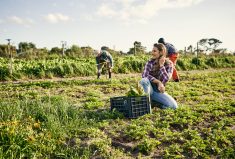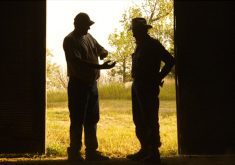University of Guelph professor Andria Jones-Bitton has been involved in farmer mental health since 2015 when she spearheaded a survey that documented the extreme levels of stress, anxiety, depression and burnout experienced by Canada’s farmers. Distressingly, though, Jones-Bitton says preliminary results from a subsequent survey her team conducted in 2021 indicate stress levels are as high or even higher than during that first survey.
Stress that isn’t acknowledged or managed well can take a toll mentally, emotionally and physically on farm managers, employees and family.
Country Guide reached out to Jones-Bitton and other agricultural mental health advocates for practical tips, tools and resources to support mental wellness on the farm.
Read Also

‘No agenda, no attenda’: How to professionalize your family farm meetings
Establishing meeting ground rules can help a farm family find ways to communicate that work for the business and the family.
Make information on mental health resources available
Fill in the list of supports in the Emergency Response Model for Mental Health During Agricultural Crises document (see link in the Resources section.)
This should include the names of friends, family, a place of worship or farmer assistance program. Highlight programs that are provided at no cost and hang it in a prominent place in the barn, the lunch room or the home. “This shows mental health is always at the forefront and that people have ready access to support if needed,” Jones-Bitton says.
Some extended medical benefits cover the cost of counselling. If your farm has this insurance coverage, says Lauren Van Ewyk, a registered social worker and sheep farmer from Courtright, Ont., make sure your farm team is aware of it.
Change the culture of agriculture
In the 2015 survey, 40 per cent of responding farmers acknowledged that they wouldn’t reach out for professional help “because of what people might think.”
Jones-Bitton, with the help of others including farmers, developed the four-hour In the Know mental health literacy training program “to increase knowledge, decrease stigma and increase the likelihood that team members pick up on signs,” The program is now being delivered in six provinces through various partners.
“It’s about keeping an eye out for each other,” says Jones-Bitton.
Boissevain, Man. farm family coach Elaine Froese is also a strong proponent of mental health literacy training. She recently took the one-day Mental Health First Aid course offered through the Mental Health Commission of Canada.
The course “will give you more confidence to have supportive conversations with your family, friends and the neighbour down the road who needs a listening ear,” Froese says.
“It’s not your job to diagnose but it is your role to be a supportive listener, to re-frame what the struggling person is saying, to validate their feelings, and help them create options for their next steps,” says Froese.
Lesley Kelly, who farms with her brother and husband near Watrous, Sask., co-founded the Do More Ag Foundation. It advocates developing a community that fosters a safe environment for difficult conversations and building resources to support farmers. Do More Ag has created the Talk, Ask, Listen four-hour virtual or in-person workshop which is delivered to communities across Canada.
A second four-hour AgCulture workshop is geared to helping mental health professionals better understand the unique stresses involved in farming.
Leaders should lead the way
When the farm leader embraces self-care and self-compassion, it sets a positive example for the employees and other team members, says Van Ewyk.
Jones-Bitton agrees. She advises farm managers to promote self-care through frequent reminders and assistance with accessing self-care. This could include allowing time off for medical appointments and opportunities to connect socially.
The farm team could brainstorm some creative ways to include self-care during the day, says Jones-Bitton. Some possibilities she has heard from participating farmers include keeping a skipping rope in the barn and walking to check the fences instead of taking the ATV.
“If you take a family member with you to check the fences, then it’s both family time and exercise. It doesn’t take a lot of time, money or investment,” she says. “These things add up.”
Kelly says her father made mental health a priority for their farm team a decade ago and her family continues this approach today. They regularly check in with each other, rating their current stress levels and if necessary, changing the game plan accordingly. They know that taking breaks is productive and that “taking care of us is also taking care of the farm,” she says.
Van Ewyk thinks this is a good plan of action. “Contrary to what we may have been taught, self-care is not selfish, self-indulgent or self-absorbed. It’s about preserving your own health.”
Be on the lookout for signs of stress
Kathy Somers who runs the Stress Management & High Performance Clinic at the University of Guelph encourages farm managers to be aware of signs of stress in their team members. “Do they have bags under their eyes, are they isolating themselves or acting impatient? Be aware of what’s normal and be on the lookout for changes,” Somers says.
Plan for risks
The uncertainty around climate, the pandemic and farming can lead to feelings of helplessness and hopelessness that set farmers up for mental illness, says Jones-Bitton. Having a formal emergency plan in place and insurance to cover risks can help mitigate this stress.
Foster open communication
Somers also recommends having regular discussions around how everyone is doing all the time, not just when things aren’t going well. She suggests having a quick daily check-in. Ask “What happened yesterday? What’s coming up today? How are you?”
Then at the end of the week, Somers suggests having a quick wrap-up meeting to discuss “How did the week go? What’s coming up? What are we going through individually and as a team?”
Kelly agrees open dialogue is important but adds that if you really want to know how someone is doing, using alternative phrasing to the standard “How are you?” will send a message that you’re looking to have a deeper conversation. Some alternatives could be: “How are you holding up? What is on your mind (or worrying you) at the moment? What do you think the next steps are? What’s helping you cope at the moment? What can I do to support you at the moment?”
Van Ewyk has similar advice. “Get curious,” she advises. “Ask open-ended questions like “Tell me about …,” “Help me to understand …,” or “What do you think?”
If someone says, “I can’t take this anymore,” Van Ewyk suggests probing further by following up with “What is the ‘this?’” or “Help me understand what is going on.” And be sure to give them space to talk, she adds.
“Seek clarification,” continues Van Ewyk. When you clarify, you summarize what the person has said. This serves two purposes: it ensures that you have understood what they are saying but also helps the person feel heard.
Then, be empathetic. “Having an empathetic listener can be calming and reassuring, even healing,” says Kelly.
“Empathy requires taking a moment to step outside of our normal patterns of thinking and feeling to imagine what it feels like to be the person in front of us.”
Agrees Van Ewyk: “Empathy drives us toward building relationships” while “sympathy lets our ‘fix-it’ role take over,”
Take time to be thankful
Over and over again the research shows the positive impact that being thankful has on our mood.
So don’t just wait for it to happen on its own. Talk to your team members about the benefits of making gratitude part of their daily routine, not just for them, but for you too, Van Ewyk recommends. Then help everyone find concrete, measurable ways to do exactly that.
Resources
- For an explanation of the difference between empathy and sympathy, see this animated explanation from University of Houston social researcher and best-selling author, Brené Brown.
- Mental Health First Aid courses at mhfa.ca
- In the Know training developed by the University of Guelph is now offered via partnering organizations in Ontario, P.E.I., Nova Scotia, B.C., Alberta and Manitoba. For more information visit ajbresearch.com
- Do More Ag Foundation is a non-profit organization that champions mental health for Canadian farmers. Find a list of therapists with knowledge of agriculture at domore.ag
- Emergency Response Model for Mental Health During Agricultural Crises and other resources from the University of Guelph ajbresearch.com/resources
- Farm Stress Inventory (PDF) from the Canadian Agricultural Safety Association
- Fostering Resiliency in Agriculture is a 16-page guide from the University of Saskatchewan Canadian Centre for Health and Safety in Agriculture
- A sampling of electronic mental health supports curated by the Canadian charity The Stigma-Free Society is available at ruralmentalwellness.com
















